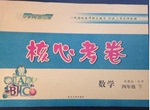题目内容
--What are you doing this Saturday?
--I’m not sure, but I ______ go to the Rolling Stones concert.
A.must B. would C. should D. might
练习册系列答案
 小学同步三练核心密卷系列答案
小学同步三练核心密卷系列答案
相关题目
题目内容
--What are you doing this Saturday?
--I’m not sure, but I ______ go to the Rolling Stones concert.
A.must B. would C. should D. might
 小学同步三练核心密卷系列答案
小学同步三练核心密卷系列答案